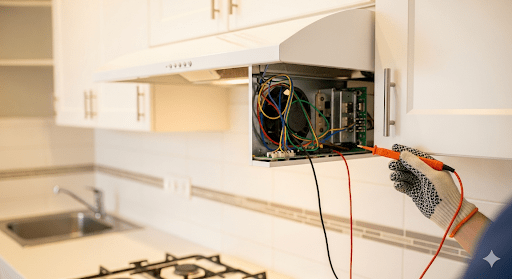Electrical Appliances
Range Hoods
Strategic Recommendations for Range Hoods (IS 302 Part 2/Sec 31:2009)
- Apply for BIS Certification Early – Start the BIS licensing process under IS 302 (Part 2/Sec 31):2009 well before enforcement deadlines to avoid last-minute hurdles.
- Partner with ERA Compliance Experts – ERA Compliance Team can assist in documentation, lab testing, and ISI mark compliance.
- Contact ERA Support – 📧 cs@eraglobal.co.in | 📞 +91 9599296331 | 💬 WhatsApp – support available for certification filing, testing coordination, and exemption management.
- Monitor Notifications & Updates –Subscribe to ERA NEWSLETTER for compliance alerts. Track amendments to QCO enforcement timelines, especially for MSMEs.
- Conduct Gap Analysis – Review product safety, motor reliability, thermal protection, and marking requirements against IS 302 (Part 2/Sec 31):2009. Rectify non-compliance areas before enforcement begins.

| Section | Details |
|---|---|
| Product Name | Safety of Household and Similar Electrical Appliances – Particular Requirements – Range Hoods |
| Applicable Indian Standard (IS) No. | IS 302 (Part 2/Sec 31): 2009 |
| Title of Indian Standard | Safety of Household and Similar Electrical Appliances – Particular Requirements – Range Hoods |
| Quality Control Order | Household Electrical Appliances (Quality Control) Order, 2023 |
| Notification & Amendments | Notified via S.O. 1128(E), dated March 5, 2024 |
| Final Enforcement Date | Medium & Large enterprises: Sept 5, 2024 Small enterprises: Dec 2024 Micro enterprises: Mar 2025 |
| Objective & Scope | To ensure electrical safety, fire safety, and performance of range hoods through BIS certification and compliance with IS 302 (Part 2/Sec 31):2009. |
| Products Covered | Electrical range hoods for household and similar use, including chimney-type hoods and under-cabinet exhaust systems. |
| Exemptions | - Appliances manufactured exclusively for export - Equipment for research/testing (not sold in the market) - Possible MSME phased compliance timelines. |
| Industries Impacted | - Household appliance manufacturers - Kitchen equipment OEMs - Importers of electrical range hoods - Appliance retailers and distributors. |
| Mandatory Compliance | All range hoods must conform to IS 302 (Part 2/Sec 31):2009, carry the ISI mark, and require BIS license under Scheme-I of BIS (Conformity Assessment) Regulations, 2018. |
| Next Steps for Stakeholders | Apply for BIS license, complete testing in BIS-recognized labs, update packaging/marking with ISI symbol, declare existing non-marked stock (if exemptions apply). |
| Legal Framework Provision & Enforcement | Enforced under BIS Act, 2016. Penalties include seizure of goods, fines, imprisonment (up to 2 years), and suspension/cancellation of BIS license. |
| Conclusion | Range hoods must comply with IS 302 (Part 2/Sec 31):2009 and carry BIS certification, ensuring consumer safety and market standardization. |
| References / Annexures | IS 302 (Part 2/Sec 31):2009 – Safety of Household and Similar Electrical Appliances – Particular Requirements – Range Hoods. |
Ready to start your certification journey?
Let us help you navigate regulatory challenges and achieve certification with ease. Leave us your details, and we’ll get back to you—or request a free consultation today.
Get in touch with us today
Notification
The product Range Hoods covered under Household Electrical Appliances (Quality Control) Order 2024,notified via S.O. 1128(E) dated March 5, 2024 mandates BIS certification for range hoods under IS 302 (Part 2/Sec 31):2009, notified by the Ministry of Commerce & Industry under the BIS Act, 2016. All range hoods must bear the ISI mark before being sold in the Indian market.
Enforcement Timeline
Medium and Large Enterprises: Effective six months from the notification date (i.e., September 5, 2024).
Small Enterprises: Effective nine months from the notification date (i.e., December 5, 2024).
Micro Enterprises: Effective twelve months from the notification date (i.e., March 5, 2025).
Overview
Range hoods are used to ventilate kitchens by removing smoke, grease, and odors. Being electrical appliances, they pose potential risks of electric shock, overheating, fire hazards, and mechanical failures. IS 302 (Part 2/Sec 31):2009 ensures that range hoods meet stringent electrical safety, thermal protection, and performance requirements, reducing hazards in domestic and commercial kitchens.
Objective & Scope
The purpose of this standard is to regulate the design, insulation, motor safety, airflow reliability, and fire prevention measures in range hoods. The scope applies to all electrical range hoods used in households and similar applications.
Products Covered
Includes wall-mounted chimney-type hoods, under-cabinet hoods, island hoods, and other electrically powered kitchen ventilation systems.
Exemptions Provided
Exemptions apply for products meant exclusively for export, appliances made for R&D/testing, and phased compliance timelines for MSMEs (if provided under the QCO).
Industries Impacted
This QCO impacts appliance manufacturers, OEM suppliers of kitchen equipment, importers of electrical range hoods, and appliance distributors/retailers.
Mandatory Compliance Requirements
Manufacturers must obtain BIS certification under IS 302 (Part 2/Sec 31):2009, ensure ISI marking on all units and packaging, and conduct testing in BIS-recognized laboratories as per Scheme-I of the BIS (Conformity Assessment) Regulations, 2018.
Next Steps for Stakeholders
Stakeholders should apply for BIS certification without delay, conduct testing of range hoods in accredited labs, update packaging with ISI marking, and declare pre-certified/imported stock where exemptions apply.
Legal Provisions, Enforcement & Penalties
Compliance is enforced under the BIS Act, 2016. Non-compliance may attract seizure of goods, fines, imprisonment up to two years, and license suspension/cancellation.
Conclusion
From the notified enforcement date, all range hoods must comply with IS 302 (Part 2/Sec 31):2009 and bear BIS certification. This safeguards consumer safety, assures consistent product quality, and ensures compliance across the Indian market.
Ready to start your certification journey?
Let us help you navigate regulatory challenges and achieve certification with ease. Leave us your details, and we’ll get back to you—or request a free consultation today.
